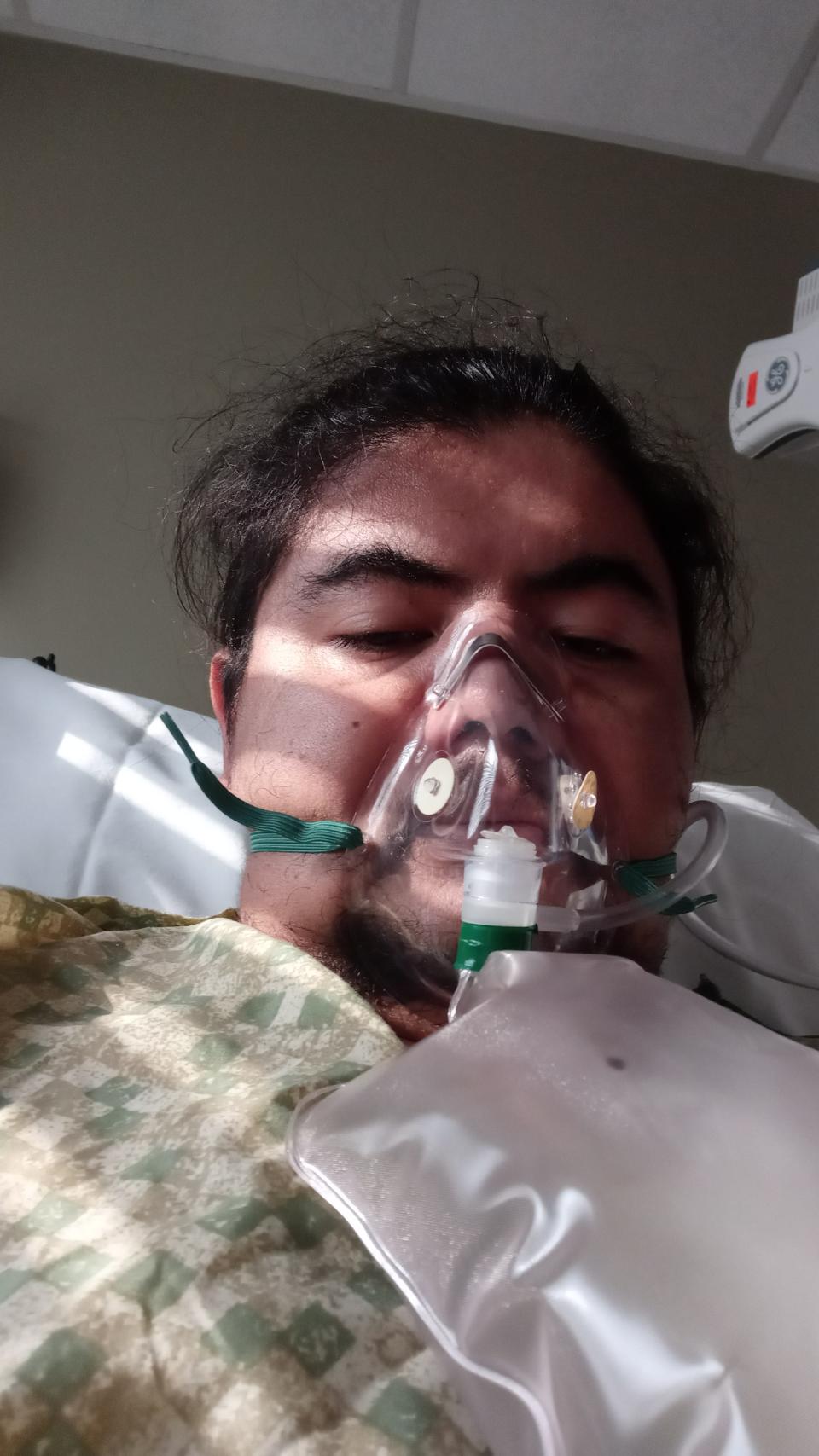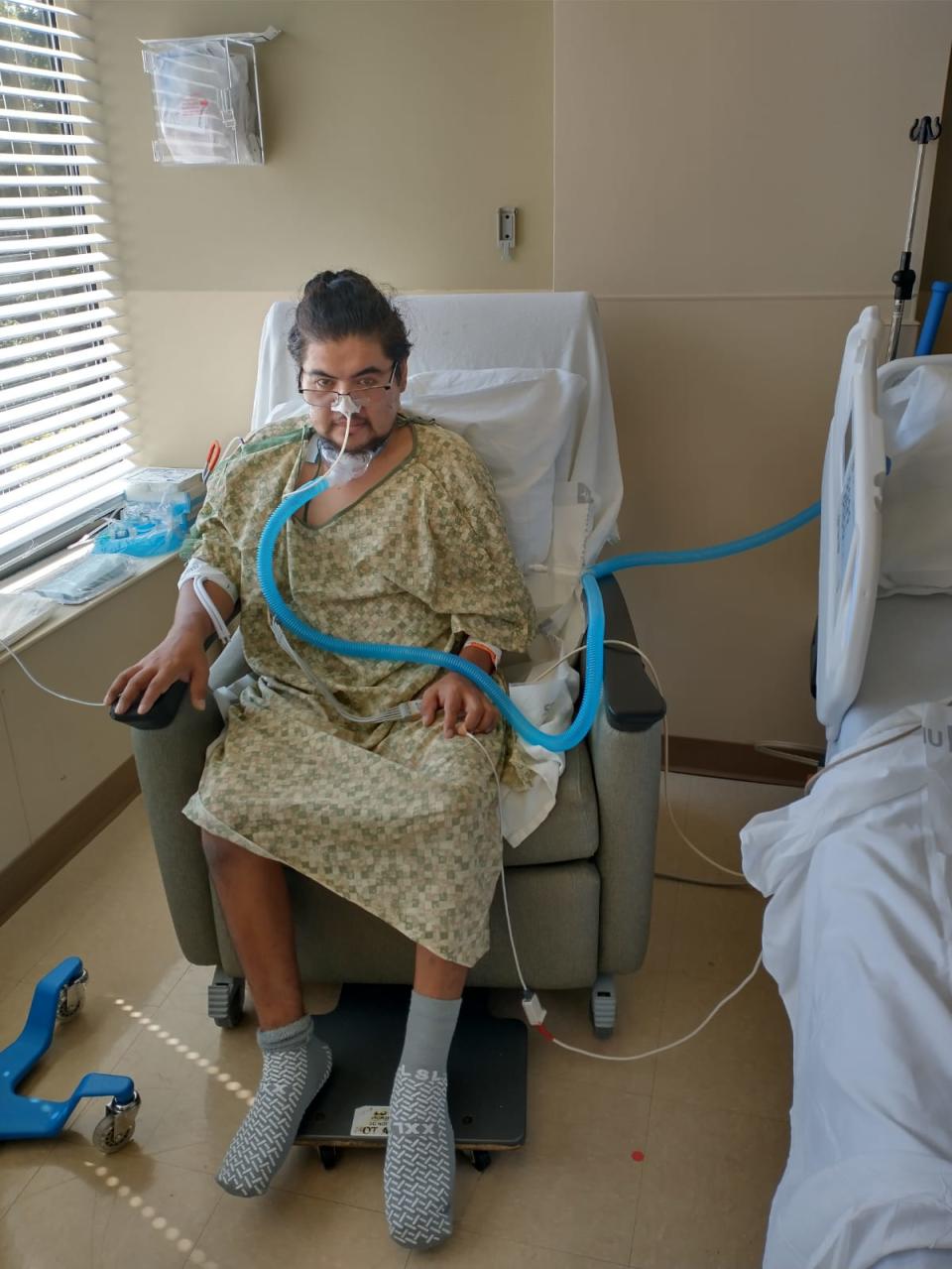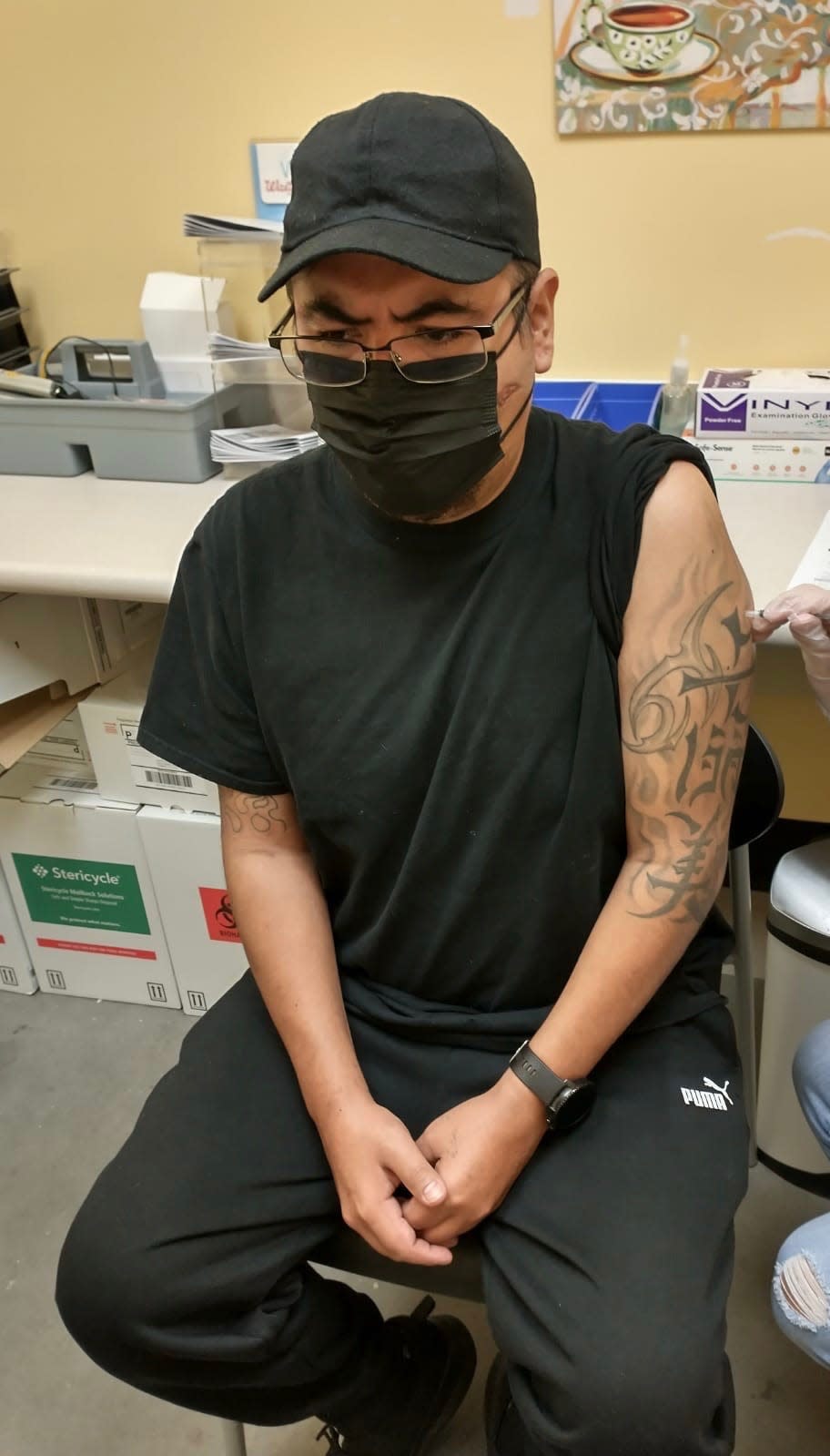'I have a purpose': Manor man who survived COVID-19 becomes vaccine evangelist
- Oops!Something went wrong.Please try again later.
Last spring, Manuel Chimal, 38, was going to get his COVID-19 vaccine. His wife got hers. His older daughter, Karima, who was 17, got hers. His younger daughter, Raquel, who is 11, was waiting for the vaccine to be authorized for her age group.
As the owner of a business in residential and commercial glass, Chimal was working 12- to 13-hour days to keep up with the growing construction demand.
"I was going to make time later," Chimal said. "I never made time."
At least, not until after the Manor resident spent three months in the hospital, including one month in intensive care and weeks on a ventilator.
'I don't want to wait'
Last March and April, when Chimal first thought about getting vaccinated, demand was high, and getting a vaccine required making an online appointment through a public health or pharmacy portal.
Chimal did find out about a place he might be able to get it without making an appointment, but it would require standing in line and not knowing whether the organizers had enough vaccine to cover all the people who showed up. "I don't want to wait," he said. "I was thinking like that."
He also didn't believe he was at risk of having a severe case of COVID-19. He even remembers saying at one point that he didn't think the virus would do anything to him.
Chimal didn't know that even though he was in his 30s and physically active, he was prediabetic and considered obese based on his body mass index — two known risk factors for severe COVID-19 outcomes. The biggest risk factor remains being unvaccinated.
COVID-19 risk factors: Are you at risk for COVID-19 lung disease? Central Texas plays role in key research
In the delta variant wave of last summer and the omicron wave of this winter, most of the people coming to hospitals for COVID-19 treatment and in the ICU have been unvaccinated, local doctors and hospital officials say.
"People who did get vaccinated did a lot better," said Dr. Maryam Ayaz, who treated Chimal in the intensive care unit at St. David's Medical Center. With delta, she said, she saw more younger people like Chimal, who were unvaccinated, compared with the first surges when the vaccine was not available. Those surges had more older people in the ICU.
According to recent Texas Department of State Health Services data, people who are unvaccinated are seven times more likely to test positive than fully vaccinated people and 11 times more likely to test positive than people who have had a booster dose. People who are unvaccinated are 45 times more likely to die of a COVID-19 related illness than people who are fully vaccinated and 105 times more likely than people with a booster dose.
In Travis County, vaccination rates have increased as the vaccine has become more readily available. Now 83.5% of people ages 5 and older have had at least one dose of the vaccine, and 72% are fully vaccinated. Of the fully vaccinated people, 43.2% have had a booster dose.
Even with relatively high vaccination rates, local hospitals continued to see unvaccinated people in the ICU during the omicron surge.
Vaccine boosters: Do I really need to get a COVID-19 booster? CDC real-world study confirms effectiveness
Coming down with COVID-19
When Chimal first started feeling sick July 14, he was in a lot of pain and had a high temperature.
He'd had pneumonia seven years before and was in the hospital that time for four days.
"You can't compare that," he said. "COVID is more strong. I can't even describe it."
On July 17, when Chimal's oxygen levels began to drop, he became dizzy. His wife woke up and found him on the floor. She took him to the emergency room, but he wasn't considered sick enough to be admitted.
He continued to get worse. His wife called 911, and he went by ambulance to that same hospital, but he was told to drink fluids and he would be fine because of his age.
Two days later, he went to his regular clinic, which sent him to St. David's Medical Center to be admitted and put on oxygen.
Chimal spent three weeks in a COVID-19 unit and continued to have respiratory attacks.

He remembers that one night was so bad he called his wife to tell her he couldn't do it anymore.
"She was always like, ‘You've got to fight it; you've got to fight it,’” he said. She would send him Bible verses about being being strong and brave.
He remembers telling her, "I feel like I'm dying right now. How can I be more strong and brave?" He also remembers thinking it would be better if God would just taken him right then.
He said he got right with God and told him, “‘If I'm going to die, I want you to take care of my family, and I'll see you there. If I'm going to die, just stay with my family. That's all I need. Take care of my daughters; take care of my wife.’ It was hard.”
He wasn't getting better, and his breathing became more labored. His whole body hurt. One night, he said, "I called the nurse and told her, ‘I can't breath anymore.’”
At that point he was told there was no other way to save his life; he had to be intubated and let a ventilator do the breathing for him.
"If there's no other options, ‘let's do it,’” he remembers saying, but he did ask the doctor if he could die. The doctor confirmed that was a possibility. Chimal asked the staff to give him five minutes so he could call his wife.
The last thing he remembers is being transferred to the ICU.
A slow recovery
For a month, he was in the ICU and intubated. He was given steroids and antivirals to try to treat the infection.
When it comes to how long a patient will be intubated and what the outcome will be, "there's no way to look at the patient and predict," Ayaz said. Chimal was one of the patients with a longer ICU stay and intubation period, she said. "He was a very sick guy."
Surviving COVID-19: San Marcos mom's pregnancy becomes fight to survive COVID-19, 3 strokes
Eventually, he started to turn the corner, and the staff was able to take him off the ventilator for periods of time for him to breath on his own. He was able to have a smaller and smaller tracheotomy tube until they were able to cap it and then remove it.
When he woke up, he remembers looking around and seeing his wife and two daughters, who were asking him a lot of questions, such as, ‘Do you know who I am?’ He remembers thinking that he didn't, but then, "Hold on, hold on: you're my wife."
It took him a week to get all of the intubation medications out of his system. During that time, he was hallucinating and not sleeping.
Finally, he was able to be in a step-down unit instead of the ICU and then move to the rehabilitation hospital.
Growing health care: 3 new hospitals part of St. David's HealthCare $1 billion Austin-area expansion plan

Relearning everything
Because Chimal had been intubated for a month, the muscles around his throat that are used for swallowing and talking were swollen, and he had forgotten how to use them.
He was weak and had lost 46 pounds. He had nerve damage in his hands.
"I would walk four steps and feel like I had run a marathon," Chimal said.
Dr. Robert Lee, who saw Chimal in St. David's Rehabilitation Hospital, said the impact of COVID-19 "was profound for this gentleman."
"By the time he got to us, he was pretty debilitated," Lee said.
Being on an ventilator for a month and the steroids used to control the infection cause the muscles to be disrupted and degenerate, Lee explained. "The muscles have trouble connecting with the nerves. They don't activate properly."
Chimal needed to have physical therapy to start walking again and get his strength up. He needed occupational therapy to be able to dress himself and shower independently, and he need speech therapy to help him learn to swallow again and to be able to eat food instead of using a feeding tube.
For the team, Lee said, the goal was for Chimal to be able to walk around his house independently and not need his wife to lift him or take him to the bathroom.

"He was motivated every single day," Lee said. "Even if he was tired, he was always asking for more therapy."
Lee said the rule of thumb is for every day in a hospital bed, it takes two days to recover.
"It's a lot easier to prevent (COVID-19) than to rehab from it," he said.
Chimal left the rehab hospital in October. He was told to wait a few weeks before getting his COVID-19 vaccine, but at the beginning of November he got his first shot, and by Thanksgiving he had received his second one. He's already planning to get his booster when it's time in April.
Just this month, he has been able to return to work, but he can't walk as long.
"Now I can work four hours and get tired really quick. I don't feel normal," Chimal said.
He still has numbness in his hands and a cough.
"My body was really, really damaged," he said.
Chimal remembers that when he first went to the emergency room at St. David's, he was asked if he was vaccinated, and then why not. "I was working," Chimal remembers replying.
"You know you can die right now," he said he was told, and then, "We're going to help you, but you have to promise me that you're going to preach about the vaccinations."
Chimal promised he would, and he has. He talks to the people he works with about getting the vaccine, tells about his experience and explains that COVID-19 is not like a cold.
He sees his survival as his second chance.
"I'm working for God already," he said. "I have a purpose."
Find a vaccination
COVID-19 vaccinations are readily available for people 5 and older at local pharmacies, including at CVS, Walgreens, Walmart, H-E-B and Randalls. They are free and do not require insurance.
This article originally appeared on Austin American-Statesman: Central Texas man who survived COVID becomes vaccine evangelist

